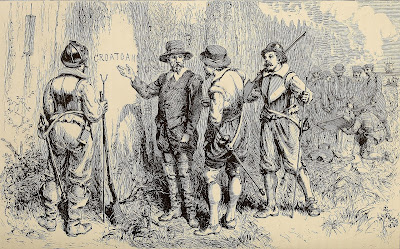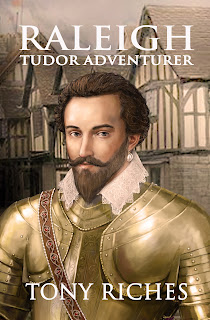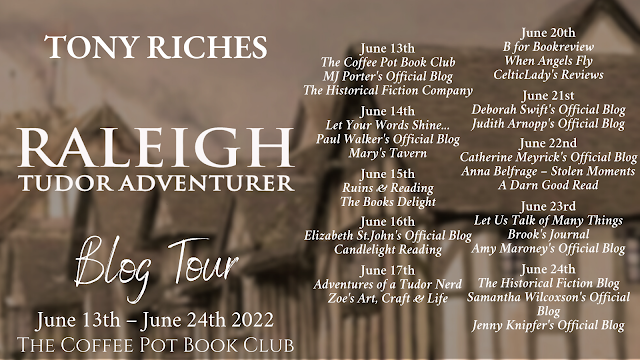Tony Riches is a prolific writer of Tudor era fiction who has joined me as a guest before. I am happy to welcome him today with a journey into early American history involving his latest protagonist, Sir Walter Raleigh, and the lost colony of Roanoke.
Welcome, Tony!
~ Samantha
~~~~~~~~~~~~~~~~~~~~~~~~~
Raleigh and the Lost Colony of Roanoke
Guest Post by Tony Riches
I’d always been intrigued by what has become known as the ‘lost colony’ and was keen to find primary sources to understand what might have actually happened. Once he gained influence at court, Raleigh promoted the idea of creating English colonies in North America to challenge Spanish colonial policy. The Roanoke adventure began when Raleigh was granted the right to explore the New World and send colonists in the name of Queen Elizabeth I.
In return for a fifth share of all gold and silver discovered, (or looted from Spanish and Portuguese ships) Raleigh could seize any land not already claimed by any ‘Christian prince’. Raleigh was well aware of the opportunities on the coast of the New World, and identified the island of Roanoke as a base for his first colony.
Unluckily for Raleigh, the queen refused permission for him to sail to Roanoke in person, so he sent Philip Amadas and Arthur Barlowe to find a suitable site for colonisation. They arrived at Roanoke Island in July, 1584, and met the native tribes, the Secotans and the Croatans. Barlowe returned with two Croatoans, named Manteo and Wanchese, who told Raleigh all about the Roanoke area. He presented them to Queen Elizabeth, which cause quite a stir at her Court, and announced he’d claimed the New World in the queen’s name, as the empire of Virginia.
Raleigh sent a second expedition of five ships, led by Richard Grenville, with his appointed governor, Ralph Lane, who had experience of establishing the English settlements in Ireland. The expedition sailed to Roanoke Island in 1585. This first attempt failed due to disagreements between Grenville and Lane, poor provisioning, and trouble with the local people, so in 1587 Raleigh replaced the military men with craftsmen, farmers, and their families, and sent another expedition, led by John White, to set up a new colony.
John White was an artist, a surprising choice for his new role as governor of the colony at Roanoke Island. They built the ‘Cittie of Raleigh’, a substantial base, with houses for each family, but White had to leave his daughter Elinor, her husband, and their infant daughter, Virginia, (the first English child born in America) when he sailed for England to report back to Raleigh in 1587 and bring back fresh supplies.
He was not to know that the Spanish Armada would be sighted soon afterwards, and White was not allowed to return to Roanoke until 1590. To his despair he found the settlement abandoned, and his possessions ransacked. The single word ‘CROATOAN’ was found carved on a tree. John White hoped this was a sign to show where the colonists had gone, but he was unable to search nearby Croatoan Island and returned home to tell Raleigh of the disaster.
The fate of the lost colony has been a mystery for many years, but archaeologists have uncovered new evidence suggesting that the survivors divided into different settlements, and at least some were assimilated into the local population.
I enjoyed researching the life and times of Sir Walter Raleigh, and discovering his strengths and weaknesses, as a courtier, explorer and failed politician, soldier and poet, a man ready to speak up for the poor and to honour his debts. My hope is that my new book, Raleigh – Tudor Adventurer, will help readers see beyond the myths and half-truths, and have a better understanding of the man who has been called the last true Elizabethan.
Tudor adventurer, courtier, explorer and poet, Sir Walter Raleigh has been called the last true Elizabethan.
He didn’t dance or joust, didn’t come from a noble family, or marry into one. So how did an impoverished law student become a favourite of the queen, and Captain of the Guard?
The story which began with the best-selling Tudor trilogy follows Walter Raleigh from his first days at the Elizabethan Court to the end of the Tudor dynasty.
Tony Riches is a full-time UK author of best-selling historical fiction. He lives in Pembrokeshire, West Wales and is a specialist in the lives of the Tudors. He also runs the popular ‘Stories of the Tudors ’podcast, and posts book reviews, author interviews and guest posts at his blog, The Writing Desk. For more information about Tony’s books please visit his website and find him on Facebook, Instagram, and Twitter.






.png)
